Related Research Articles
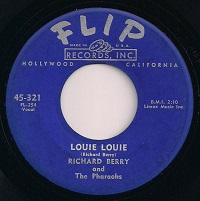
"Louie Louie" is a rhythm and blues song written and composed by American musician Richard Berry in 1955, recorded in 1956, and released in 1957. It is best known for the 1963 hit version by the Kingsmen and has become a standard in pop and rock. The song is based on the tune "El Loco Cha Cha" popularized by bandleader René Touzet and is an example of Afro-Cuban influence on American popular music.

Manfred Mann were an English rock band formed in London in 1962. They were named after their keyboardist Manfred Mann, who later led the successful 1970s group Manfred Mann's Earth Band. The group had two lead vocalists: Paul Jones from 1962 to 1966 and Mike d'Abo from 1966 to 1969. Other members of various group line-ups were Mike Hugg, Mike Vickers, Dave Richmond, Tom McGuinness, Jack Bruce and Klaus Voormann.

Wet Wet Wet is a Scottish soft rock band formed in 1982. They scored a number of hits on the UK charts and around the world in the 1980s and 1990s. They are best known for their 1994 cover of the Troggs' 1960s hit "Love Is All Around", which was used on the soundtrack to the film Four Weddings and a Funeral. The song was an international success, and spent 15 weeks at the top the UK Singles Chart. The band is currently composed of founding member Graeme Clark and lead vocalist Kevin Simm, who replaced founding member Marti Pellow in 2018 after he left during the previous year. Graeme Duffin has also been with the band as a touring musician since 1983. The band were named Best British Newcomer at the 1988 Brit Awards.
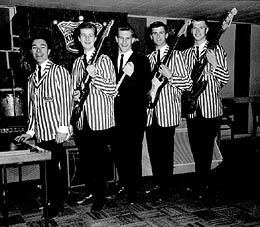
The Kingsmen are a 1960s American rock band from Portland, Oregon. They are best known for their 1963 recording of R&B singer Richard Berry's "Louie Louie", which held the No. 2 spot on the Billboard charts for six weeks and has become an enduring classic.

Arthur Alexander was an American country-soul songwriter and singer. Jason Ankeny, music critic for AllMusic, said Alexander was a "country-soul pioneer" and that, though largely unknown, "his music is the stuff of genius, a poignant and deeply intimate body of work on par with the best of his contemporaries." Alexander's songs were covered by such stars as the Beatles, the Rolling Stones, Bob Dylan, Gerry and the Pacemakers, Otis Redding, Tina Turner, Pearl Jam, and Jerry Lee Lewis.

Paul Revere & the Raiders were an American rock band formed in Boise, Idaho, in 1958. They saw considerable U.S. mainstream success in the second half of the 1960s and early 1970s. The band was known for including Revolutionary War-style clothes in their attire.

"Knockin' on Heaven's Door" is a song by American singer-songwriter Bob Dylan, written for the soundtrack of the 1973 film Pat Garrett and Billy the Kid. Released as a single two months after the film's premiere, it became a worldwide hit, reaching the Top 10 in several countries. The song became one of Dylan's most popular and most covered post-1960s compositions, spawning covers from Eric Clapton, Guns N' Roses, Randy Crawford, and more.

Bob Dylan's Greatest Hits is a 1967 compilation album of songs by the American singer-songwriter Bob Dylan. Released on March 27, 1967, by Columbia Records, it was a stopgap between Dylan's studio albums Blonde on Blonde and John Wesley Harding, during which time he had retreated from the public eye to recover from a motorcycle accident.

"Quinn the Eskimo (The Mighty Quinn)" is a folk-rock song written and first recorded by Bob Dylan in 1967 during the Basement Tapes sessions. The song's first release was in January 1968 as "Mighty Quinn" in a version by the British band Manfred Mann, which became a great success. It has been recorded by a number of performers, often under the "Mighty Quinn" title.
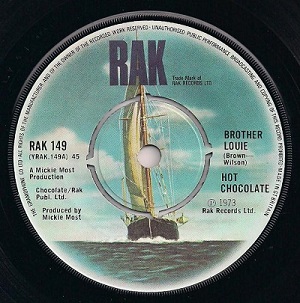
"Brother Louie" is a song by British soul band Hot Chocolate. Written by members Errol Brown and Tony Wilson and produced by Mickie Most, the song discusses an interracial love affair between a white man and a black woman, and the subsequent rejection of both by their parents because of it. Upon its release as a single, "Brother Louie" peaked at number 7 on the UK Singles Chart in 1973. Alexis Korner has a spoken word part in this version of the song. Phil Dennys arranged the string section.
Stories was an American early 1970s rock and pop music band based in New York City. The band consisted of keyboardist Michael Brown, bassist/vocalist Ian Lloyd, guitarist Steve Love, and drummer Bryan Madey, and had a Number 1 hit with a cover of Hot Chocolate's "Brother Louie."

"Just Like Tom Thumb's Blues" is a song written and performed by Bob Dylan. It was originally recorded on August 2, 1965, and released on the album Highway 61 Revisited. The song was later released on the compilation album Bob Dylan's Greatest Hits Vol. II and as two separate live versions recorded at concerts in 1966: the first of which appeared on the B-side of Dylan's "I Want You" single, with the second being released on The Bootleg Series Vol. 4: Bob Dylan Live 1966, The "Royal Albert Hall" Concert. The song has been covered by many artists, including Gordon Lightfoot, Cat Power, Nina Simone, Barry McGuire, Judy Collins, Frankie Miller, Linda Ronstadt, the Grateful Dead, Neil Young, The Black Crowes, Townes Van Zandt, Bryan Ferry, and The Handsome Family. Lightfoot's version was recorded only weeks after Dylan's original had been released and reached #3 on the Canadian RPM singles chart.

"Get Down on It" is a 1981 song by American band Kool & the Gang. It was originally released on their Something Special album in 1981. The single was certified Gold by the RIAA.

"Walk On By" is a song written by Burt Bacharach and Hal David for singer Dionne Warwick in 1963. Warwick's recording of the song peaked at number 6 on the US Billboard Hot 100 and number 1 on the Cash Box Rhythm and Blues Chart In June 1964 and was nominated for a 1965 Grammy Award for the Best Rhythm and Blues Recording.

"Itchycoo Park" is a song by English rock band Small Faces, written by Steve Marriott and Ronnie Lane. Largely written by Lane, it was among a number of pop songs of the era to make use of flanging, an effect involving, at that time, electro-mechanical processes. The song was not included on any of their UK albums, but was however featured on the North American release There Are But Four Small Faces (1968).

"Love Is the Drug" is a song by the English rock band Roxy Music, from their fifth studio album, Siren (1975), released as a single in September 1975. Co-written by Bryan Ferry and Andy Mackay, the song originated as a slower, dreamier track until the band transformed its arrangement to become more dance-friendly and uptempo. Ferry's lyrics recount a man going out looking for action.
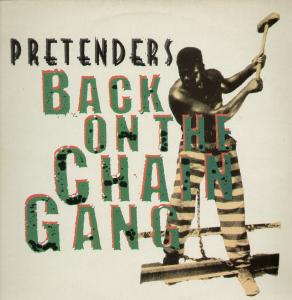
"Back on the Chain Gang" is a song written by American-British musician Chrissie Hynde, originally recorded by her band the Pretenders and released as a single by Sire Records in September 1982. The song was included on The King of Comedy soundtrack album in March 1983 and was later included on the Pretenders' third album, Learning to Crawl, in January 1984.
"Opa Opa" is a song by Greek singer Notis Sfakianakis, released as a single from his second album Ise Ena Pistoli in 1992. Opa Opa is a laïko dance song and was written and produced by singer Giorgos Alkaios in 1992.
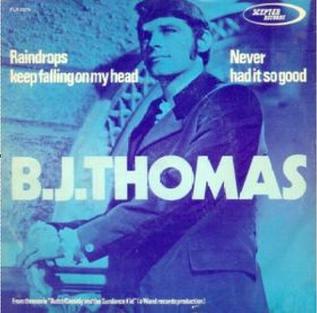
"Raindrops Keep Fallin' on My Head" is a song written by Burt Bacharach and Hal David for the 1969 film Butch Cassidy and the Sundance Kid. The uplifting lyrics describe somebody who overcomes his troubles and worries by realising that "it won't be long till happiness steps up to greet me."

"Muscle Bound" is a song by the English new wave band Spandau Ballet, released as part of the third single from their debut album Journeys to Glory. In the UK, it was released as a double A-side with the song "Glow"; elsewhere, "Glow" was included as the B-side. "Muscle Bound" received mostly good reviews, and the combined single was their third consecutive top 20 hit in their native UK, reaching number 10 on the UK Singles Chart. The music video for "Muscle Bound" was more ambitious than their previous promotional clips and went over budget because of snowy weather that caused delays during the location shoot.
References
- ↑ "Site search". everyHit.com. Retrieved 10 October 2008.
- ↑ "THE LOUIE REPORT". OCTALOUIE, LLC. 28 November 1999. Retrieved 11 September 2008.
- ↑ "Three Amigos, The". Discogs. Retrieved 11 September 2008.
- ↑ "Pacific Penthouse Presents". inthemix. 9 August 2004. Archived from the original on 10 March 2009. Retrieved 12 September 2008.
- ↑ Colwill, Richard; Marsh, Stefanie (9 August 2004). "'Privileged' drug gang jailed for total of 36 years". Times Online. Retrieved 12 September 2008.[ dead link ]
- ↑ Roberts, David (2006). British Hit Singles & Albums (19th ed.). London: Guinness World Records Limited. p. 558. ISBN 1-904994-10-5.
- ↑ "Discography The Three Amigos". australian-charts.com. Retrieved 30 August 2022.